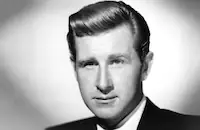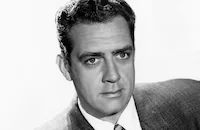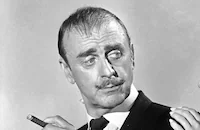Airplane II: The Sequel
Brief Synopsis
Cast & Crew
Ken Finkleman
Robert Hays
Julie Hagerty
Peter Graves
Lloyd Bridges
William Shatner
Film Details
Technical Specs
Synopsis
Though haunted by combat memories, heroic pilot Ted Striker agrees to return to the cockpit to man the controls of Mayflower One, America's first commercial spacecraft. But, as soon as Mayflower One lifts off, an electrical malfunction sends the ship veering off course. A shaken Striker struggles to guide the shuttle through a treacherous asteroid belt, tame its failing computer systems and stop the disgruntled Joe Seluchi from detonating a deadly bomb on board.
Director
Ken Finkleman
Cast

Robert Hays

Julie Hagerty

Peter Graves

Lloyd Bridges

William Shatner

Chad Everett
Stephen Stucker
Oliver Robins
Richard Jaeckel
Dennis Howard
William Vaughan
Bruce M. Fischer
Hugh Gillin
Ed Call
Art Fleming
Mary Mercier
Steve Nevil
Ann Nelson
Sandahl Bergman
David Leisure
June Sanders
Herve Villechaize
Sandy Ward
Gail Matthius
Pat Sajak
Louis Giambalvo
Al White
Patty Dworkin
Jack Jones
Floyd Levine
Lee Patterson
Rance Howard
George Wendt
Laurene Landon
Pat Mcnamara
Steve Levitt
Stanley Lawrence
Kenneth G O'brien
Marcus Mukai
Pamela Ann Rack
Burke Byrnes
Steve Hirsch
Jim Staahl
Will Porter
Rick Overton
Michael Currie
Kent Mccord
John Hancock

Raymond Burr
Marcy Lafferty
Art Fleming
Ronald House
Sean Peters

John Vernon
Maurice Hill

John Dehner
Louise Sorel
Craig Berenson
Hilary Beane
Gary Faga
James Noble
Richard Gilliland

Rip Torn

Chuck Connors
James A Watson
Allison Hanes
Laurie Hagen
Clint Smith
Mary Farrell
Mary-robin Redd
Madeleine Fisher
Barbie Reade
B J Barie
Gregory Itzin
John Larch
Howard Honig
Frank Ashmore
Leon Askin
Ricky Powell
Lee Bryant
Bruce French
David Paymer
Elisa Goodman
Sonny Bono
Sam Anderson
Wendy Phillips
Crew
Laurie Abdo
Kelly Altman
Burt Bacharach
Susan J Bernay
Elmer Bernstein
Joseph Biroc
Joseph Biroc
Mauri Blumenfeld
Violet N Cane
Hal David
Robert Dawson
Melvin D Dellar
Melvin D Dellar
Emma Divittorio
Lamont Dozier
June Edgerton
Pamela Eilerson
David Ellis
Ken Finkleman
Charles Fox
Lisa Freiberger
Larry Gilhooly
Cara Gordon
Robert Gould
Horst Grandt
Johnny Griffin
Cecelia Hall
Richard Hazard
Michael Todd Henry
Tina Hirsch
Brian Holland
Eddie Holland
Toni Howard
Alan Howarth
Jack Jones
Phil Kellison
Howard W. Koch Jr.
Glen A Larson
George L. Little
Dennis Maguire
Steve Maslow
Rosanna Norton
Kevin O'connell
Lynn Oblinger
Tommy Overton
Pete G Papanickolas
Stu Phillips
Joe Rayner
Rose Royce
Bob Ryder
William Sandell
Jack Frost Sanders
Lalo Schifrin
Fred Smith
Lynn Stalmaster
The Supremes
Bill Varney
Dennis Virkler
George Watters
Jimmy Webb
Monty Westmore
Norman Whitfield
Rick Whitfield
Paul H. Williams
Film Details
Technical Specs
Articles
Leon Askin (1907-2005)
Born in Vienna, Austria as Leo Aschkenasy on September 18, 1907, Askin developed a taste for theater through his mother's love of cabaret, and as a youngster, often accompanied his mother to weekend productions.
He made a go of acting as a profession in 1925, when he took drama classes from Hans Thimig, a noted Austrian stage actor at the time. The following year, he made his Vienna stage debut in Rolf Lauckner's "Schrei aus der Strasse."
For the next six year (1927-33), he was a popular stage actor in both Vienna and Berlin before he was prevented to work on the stage by Hitler's SA for being a Jew. He left for Paris in 1935 to escape anti-semetic persecution, but returned to Vienna in 1935, to find work (albeit a much lower profile to escape scrutiny), but after a few years, the writing was on the wall, and he escaped to New York City in 1939, just at the outbreak of World War II. His luck in the Big Apple wasn't really happening, and in 1941, he relocated to Washington D.C. and briefly held the position of managing director of the Civic Theatre, a popular city venue of the day. Unfortunately, after the tragic events of Pearl Harbor in December of that year, the United States became involved in the war that had already engulfed Europe for two years, and seeing a possibility to expediate his application for American citizenship, he enlisted in the U.S. Army.
After the war, Leon indeed became a U.S. citizen and changed his name from Leon Aschkenasy to Leon Askin. He returned to New York and found work as a drama teacher, and more importantly, landed his first gig on Broadway, as director and actor in Goethe's Faust in 1947, which starred Askin in the title character opposite the legendary Albert Bassermann who played Mephisto. The production was a huge success. Askin followed this up with another director/actor stint with Shakespeare's Merchant of Venice and co-starred with Jose Ferrer in Ben Hecht's 20th Century. They were all Broadway hits, and Askin had finally achieved the success he had worked so hard to seek and merit.
It wasn't long before Hollywood came calling, and soon Askin, with his rich German accent and massive physical presence, made a very effective villian in a number of Hollywood films: the Hope-Crosby comedy Road to Bali (1952); Richard Burton's first hit film The Robe; and the Danny Kaye vehicle Knock on Wood (1954).
Askin's roles throughout the 50's were pretty much in this "menacing figure" vein, so little did anyone suspect that around the corner, Billy Wilder would be offering him his most memorable screen role - that of the Russian commissar Peripetschikof who gleefully embraces Amercian Capitalism in the scintillating politcal satire, One, Two, Three (1961). Who can forget this wonderfully exchange between Peripetschikof and Coca Cola executive C.R. MacNamara (James Cagney):
Peripetschikof: I have a great idea to make money. I have a storage full of saurkraut and I'll sell it as Christmas tree tinsil!
MacNamara: You're a cinch!
His performance for Wilder was wonderfully comedic and wholly memorable, and after One, Two, Three the film roles for Askin got noticable better, especially in Lulu and The Testament of Dr. Mabuse (both 1962); but he began to find prominent guest shots on hit television shows too: My Favorite Martian and The Outer Limits to name a few; yet his big break came in 1965, when for six seasons he played General Albert Burkhalter, the Nazi general who was forever taking Col. Kilink's ineptitude to task in Hogan's Heroes (1965-71).
Roles dried up for Askin after the run of Hogan's Heroes, save for the occassional guest spot on television: Diff'rent Strokes, Three's Company, Happy Days; and parts in forgettable comedies: Going Ape! (1981), Airplane II: The Sequel (1982). After years of seclusion, Askin relocated to his birthplace of Vienna in 1994, and he began taking parts in numerous stage productions almost to his death. In 2002, he received the highest national award for an Austrian citizen when he was bestowed with the Austrian Cross of Honor, First Class, for Science and Art. He is survived by his third wife of three years, Anita Wicher.
by Michael T. Toole

Leon Askin (1907-2005)
Elmer Bernstein (1922-2004)
Elmer Bernstein, who was not related to Leonard Bernstein, was born on August 4, 1922, in New York City. He displayed a talent in music at a very young age, and was given a scholarship to study piano at Juilliard when he was only 12. He entered New York University in 1939, where he majored in music education. After graduating in 1942, he joined the Army Air Corps, where he remained throughout World War II, mostly working on scores for propaganda films. It was around this time he became interested in film scoring when he went to see William Dieterle's The Devil and Daniel Webster (1941), a film whose score was composed by Bernard Herrmann, a man Bernstein idolized as the ideal film composer.
Bernstein, who originally intended to be a concert pianist and gave several performances in New York after being discharged from military service, decided to relocate to Hollywood in 1950. He did his first score for the football film Saturday's Hero (1950), and then proved his worth with his trenchant, moody music for the Joan Crawford vehicle Sudden Fear (1952). Rumors of his "communist" leanings came to surface at this time, and, feeling the effects of the blacklist, he found himself scoring such cheesy fare as Robot Monster; Cat Women of the Moon (both 1953); and Miss Robin Caruso (1954).
Despite his politics, Otto Preminger hired him to do the music for The Man With the Golden Arm, (1955) in which Frank Sinatra played a heroin-addicted jazz musician. Fittingly, Bernstein used some memorable jazz motifs for the film and his fine scoring put him back on the map. It prompted the attention of Cecil B. De Mille, who had Bernstein replace the ailing Victor Young on The Ten Commandments (1956). His thundering, heavily orchestrated score perfectly suite the bombastic epic, and he promptly earned his first Oscar® nod for music.
After The Ten Commandments (1956), Bernstein continued to distinguish himself in a row of fine films: The Rainmaker (1956), Sweet Smell of Success (1957), Some Came Running (1958), The Magnificent Seven (a most memorable galloping march, 1960); To Kill a Mockingbird (unique in its use of single piano notes and haunting use of a flute, 1962); Hud (1963); earned a deserved Academy Award for the delightful, "flapper" music for the Julie Andrews period comedy Thoroughly Modern Mille (1967), and True Grit (1969).
His career faltered by the '80s though, as he did some routine Bill Murray comedies: Meatballs (1980) and Stripes (1981). But then director John Landis had Bernstein write the sumptuous score for his comedy Trading Places (1983), and Bernstein soon found himself back in the game. He then graced the silver screen for a few more years composing some terrific pieces for such popular commercial hits as My Left Foot (1989), A River Runs Through It (1992) and The Age of Innocence (1993). Far From Heaven, his final feature film score, received an Oscar® nomination for Best Score in 2002. He is survived by his wife, Eve; sons Peter and Gregory; daughters Emilie and Elizabeth; and five grandchildren.
by Michael T. Toole
Elmer Bernstein (1922-2004)
Quotes
Trivia
Miscellaneous Notes
Released in United States Winter December 10, 1982
Released in United States Winter December 10, 1982













